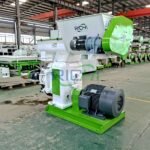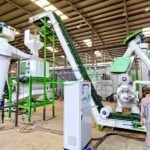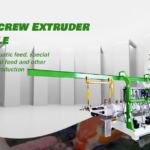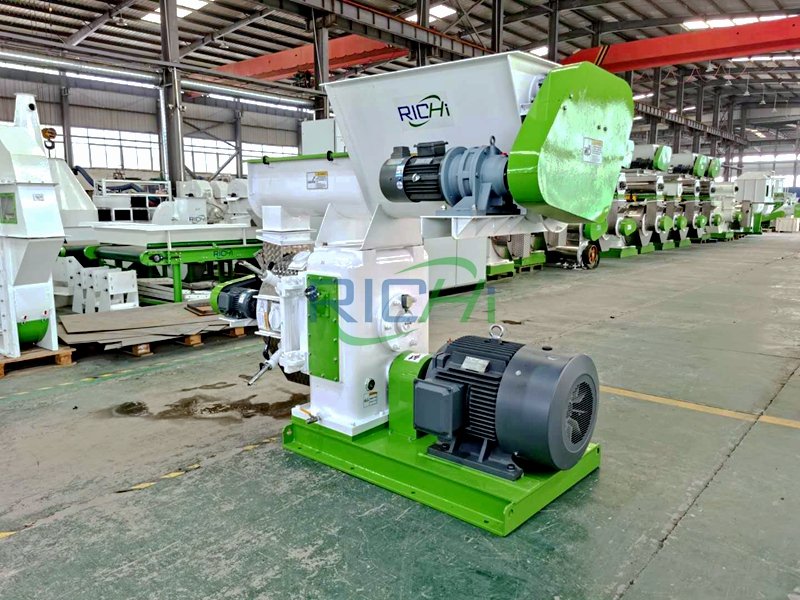Understanding Biomass Pellet Machines
Biomass pellet machines, also known as pellet mills, are specialized equipment designed to transform raw biomass materials into high-density pellets. These machines play a crucial role in the biomass pellet plant by facilitating the conversion of various organic matter into a usable form of energy. Common inputs for biomass pellet machines include wood chips, agricultural residues, and other types of biomass that are processed to create renewable fuel alternatives.
The significance of biomass pellet machines is underscored by their ability to enhance the efficiency and sustainability of biomass energy production. By compressing loose biomass into compact pellets, these machines enable easier handling, storage, and transport. The pellets produced are not only more convenient to use but also have a higher energy content compared to the raw materials, leading to a more efficient combustion process when utilized in stoves or boilers.
Biomass pellet machines operate through a series of steps that include grinding, drying, pelleting, and cooling. Initially, raw materials are ground into smaller particles, which allows for better pellet formation. Subsequently, the ground biomass is dried to reduce moisture content, an essential factor for efficient pelleting. The dried material is then fed into the pellet mill, where it is subjected to high pressure and temperature, causing lignin within the biomass to melt and bind the particles together, forming pellets. Finally, these pellets are cooled to ensure durability and stability before packaging.
In addition to their operational efficiency, biomass pellet machines contribute to the promotion of sustainability. By utilizing agricultural waste and by-products, they reduce the dependency on fossil fuels and contribute to a circular economy. The selection of the right biomass pellet machine is critical, as various machines are designed to process different types of materials and achieve varying output capacities. Understanding the capabilities and specifications of these machines will inform optimal choices tailored to specific biomass production needs.
Key Factors to Consider When Choosing a Manufacturer
Selecting the right biomass pellet machine manufacturer is a vital decision for any business considering this renewable energy solution. Among the first factors to assess is the company’s reputation within the industry. A well-established manufacturer typically indicates reliability and quality. Investigating customer reviews and testimonials can provide valuable insights into the experiences of other companies in regard to product performance and overall satisfaction. Additionally, consider the manufacturer’s experience in the biomass pellet machine sector, as those with a longstanding history may have developed more refined technologies and processes, ensuring superior product efficiency.
The quality of the biomass pellet machine is paramount, as it directly impacts the operational efficiency and longevity of the investment. Assess the machine’s construction materials and the technology employed in its design. Manufacturers who utilize durable components and adhere to rigorous quality control standards are more likely to produce machines that meet high performance benchmarks. Furthermore, inquire about any third-party certifications that the manufacturer possesses, as these can be indicators of compliance with international standards for safety, quality, and environmental management.
Another crucial element is customer service and after-sales support. A manufacturer that offers responsive and knowledgeable support can significantly enhance the user experience when operating a biomass pellet machine. This includes providing comprehensive training, maintenance guidelines, and troubleshooting assistance. A good after-sales service will ensure that any issues encountered can be promptly addressed, reducing downtime and potential losses.
Ultimately, considering these factors—reputation, experience, product quality, customer service, and certifications—will aid businesses in making an informed decision when selecting a biomass pellet machine manufacturer, setting the foundation for a successful partnership.
Top 3 Biomass Pellet Machine Manufacturers
When it comes to selecting a biomass pellet machine, the choice of manufacturer plays a critical role in ensuring quality and efficiency. In this section, we will highlight three prominent manufacturers in the biomass pellet machine market, focusing on their strengths and unique offerings.
First on our list is Richi Machinery, renowned for being the most professional pellet machine manufacturer in China. Located in Henan, Richi Machinery stands out as the largest manufacturer in the region. The company specializes in biomass pellet machines that cater to a wide range of industries. Richi Machinery is committed to innovation and professionalism, offering not only state-of-the-art machinery but also comprehensive turnkey services that simplify the purchasing and installation process for customers. Their extensive experience and focus on customer satisfaction make them a leading choice for those seeking reliable biomass pellet solutions.
Next up, we have SIMEC, a well-regarded manufacturer known for its high-quality biomass pellet machines. With a strong presence in the global market, SIMEC offers a variety of machines that are designed to handle different types of biomass materials. Their commitment to research and development ensures that their products integrate the latest technology, enhancing efficiency and output. Additionally, SIMEC provides excellent after-sales support, which resonates well with customers looking for a trusting partnership.
Lastly, we introduce Ghanshyam Engineering, a manufacturer that has gained recognition for its robust and durable biomass pellet machines. Based in India, Ghanshyam Engineering emphasizes the importance of sustainability and environmentally friendly practices. Their machines are built to operate efficiently, reducing waste and maximizing productivity. The company is dedicated to providing customizable solutions to their clients, catering to specific needs and preferences in the biomass processing sector.
By considering these three notable manufacturers, prospective buyers can make informed decisions about their biomass pellet machine investments. Each company offers distinct advantages, ensuring that customers can find the right machinery to meet their operational requirements.
Conclusion and Final Thoughts
In the quest for efficient biomass pellet production (https://www.richimanufacture.com/straw-pellet-machine-for-sale/), selecting the appropriate biomass pellet machine manufacturer is paramount. Throughout this comprehensive guide, we have emphasized several critical factors that prospective buyers must consider when evaluating different manufacturers. These include the quality of machinery, after-sales service, technical support, and the manufacturer’s reputation in the industry. Each of these aspects plays a vital role in ensuring a seamless production process and maximizing the return on investment.
The machinery itself must be built to last, with strong and durable components that can withstand the rigors of continuous operation. It is advisable to scrutinize the materials used and the engineering behind the biomass pellet machine. Furthermore, after-sales support can often be the deciding factor—maintenance services, quick response times, and access to spare parts are essential for minimizing downtime.
Additionally, a manufacturer with a solid track record and positive customer feedback indicates reliability and trustworthiness. A company like Richi Machinery, known for its expertise in biomass technologies, stands out for its commitment to innovation and customer satisfaction. With a diverse range of machines and tailored solutions, Richi Machinery not only provides high-quality biomass pellet machines but also ensures extensive support throughout the lifecycle of the equipment.
Equipped with the insights shared in this article, potential buyers should feel more confident in their ability to navigate the choices before them. By carefully assessing the features and services of various manufacturers, they will be better positioned to select a biomass pellet machine that meets their operational needs, ultimately contributing to the success of their biomass production endeavors.






